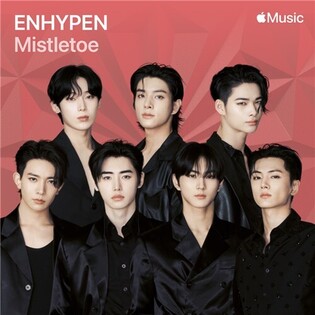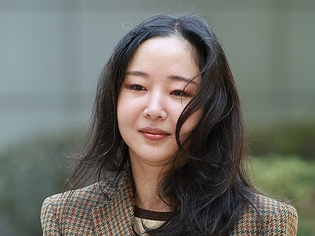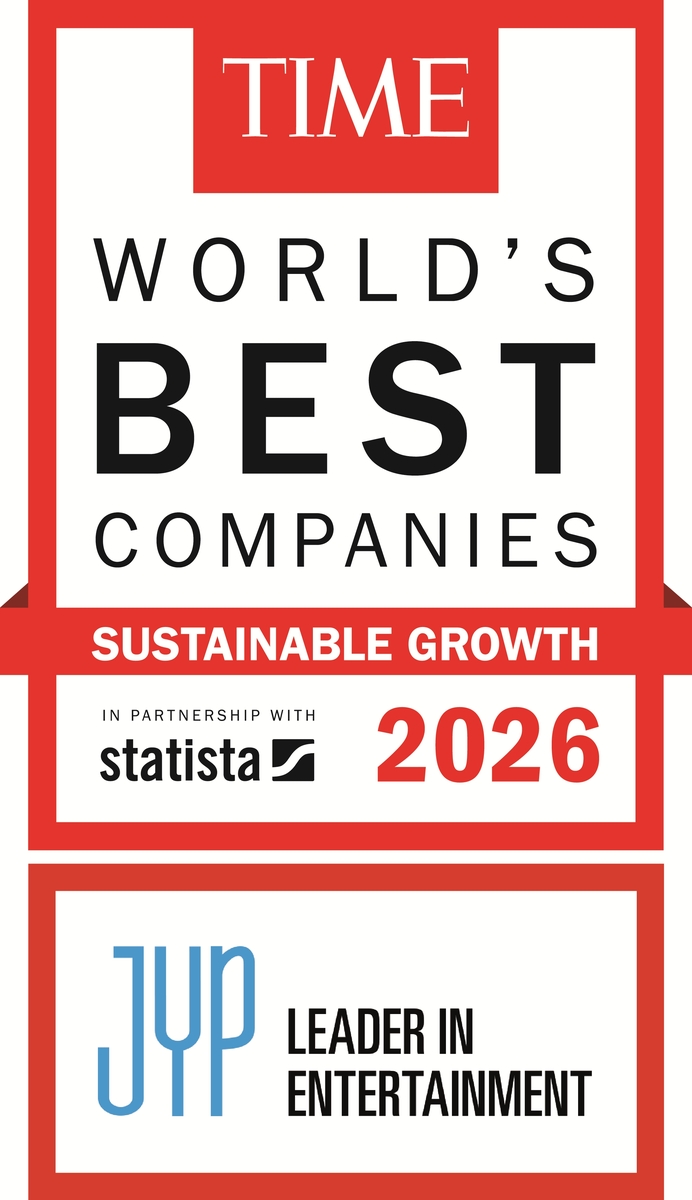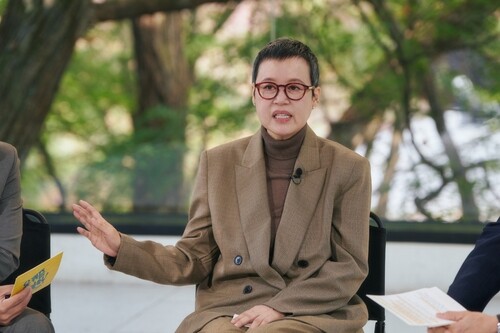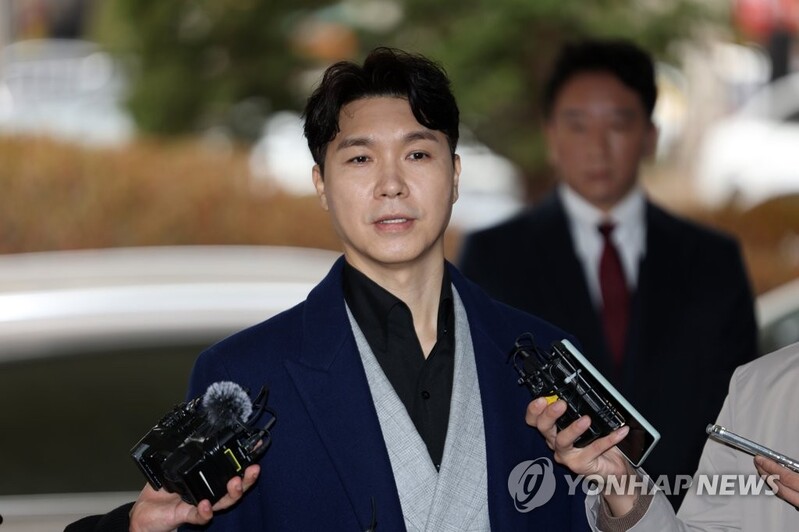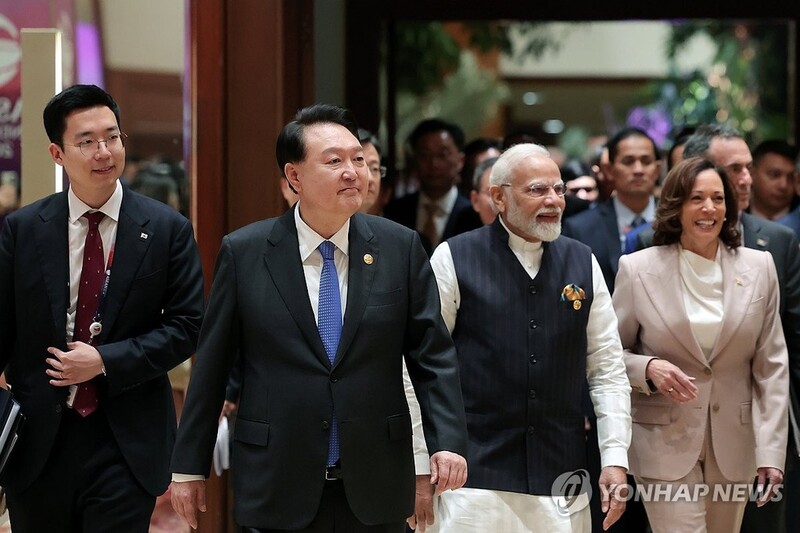 |
| ▲ South Korean President Yoon Suk Yeol (2nd from L) arrives at the East Asia Summit at the Balai Sidang Jakarta Convention Center in the Indonesian capital on Sept. 7, 2023, alongside Indian Prime Minister Narendra Modi (2nd from R) and U.S. Vice President Kamala Harris (R). (Pool photo) (Yonhap) |
(LEAD) Yoon-East Asia summit
(LEAD) Yoon says N. Korea's nuclear program is existential threat to Indo-Pacific
(ATTN: UPDATES with Yoon's actual remarks, other details; CHANGES photo)
By Lee Haye-ah
JAKARTA, Sept. 7 (Yonhap) -- South Korean President Yoon Suk Yeol said Thursday that North Korea's nuclear and missile development poses an existential threat to the Indo-Pacific region and called for the strict implementation of U.N. sanctions on the regime.
Yoon made the remark during an East Asia Summit (EAS) in Jakarta that brought together leaders from the 10 members of the Association of Southeast Asian Nations (ASEAN) and South Korea, the United States, Japan, China, Russia, India, Australia and New Zealand.
"North Korea's nuclear and missile development is a serious violation of U.N. Security Council resolutions and a direct challenge to world peace," he said. "It is an existential threat that can target and strike all nations participating in today's meeting."
Yoon especially noted the obligation of all U.N. member states to abide by U.N. Security Council sanctions resolutions against the North.
"The responsibility of the Security Council's permanent members that adopted the resolutions can be said to be heavier," Yoon said, apparently directing his remarks at Russia and China, two countries suspected of being lukewarm on sanctions enforcement against the North.
The remark came amid reports North Korean leader Kim Jong-un may travel to Vladivostok, Russia, next week to meet with Russian President Vladimir Putin and discuss a possible arms deal. A day earlier, Yoon had urged an immediate halt to "attempts at military cooperation with North Korea."
Russian Foreign Minister Sergey Lavrov and Chinese Premier Li Qiang were present at the EAS, where Yoon also discussed the need to block sources of funding for North Korea's nuclear and missile development, including cryptocurrency stealing, labor exports and maritime transshipments, and called attention to the issue of North Korea's human rights abuses.
Yoon has been in Jakarta since Tuesday to attend a series of annual summits involving ASEAN, including a South Korea-ASEAN summit and an ASEAN Plus Three summit with Japan and China.
ASEAN comprises Brunei Darussalam, Cambodia, Indonesia, Laos, Malaysia, Myanmar, the Philippines, Singapore, Thailand and Vietnam.
During the EAS, Yoon outlined South Korea's positions on key global issues.
On the war in Ukraine, he reaffirmed that Russia's invasion constitutes a clear violation of international law and shared South Korea's own experience of facing an existential crisis due to North Korea's illegal invasion in 1950. He also recalled his trip to Kyiv in July and his announcement of the "Ukraine Peace and Solidarity Initiative," a comprehensive package of security, humanitarian and reconstruction assistance.
"South Korea will faithfully execute the Ukraine Peace and Solidarity Initiative that we pledged," Yoon said. "We will contribute in a responsible manner to Ukraine's reconstruction and recovery efforts in the future."
On tensions in the South China Sea, Yoon said South Korea will not tolerate unilateral attempts to change the status quo by force and emphasized the need to establish a rules-based maritime order in the critical sea lane.
Yoon voiced concern over the continued violence and humanitarian crisis in Myanmar and expressed support for the ASEAN-proposed solution of halting violence and holding inclusive dialogue.
He also noted that both South Korea's Indo-Pacific strategy and the ASEAN Outlook on the Indo-Pacific aim for freedom, peace and prosperity in the Indo-Pacific by seeking solidarity through the establishment of a rules-based order under the principles of inclusivity, trust and reciprocity.
(END)
(C) Yonhap News Agency. All Rights Reserved







